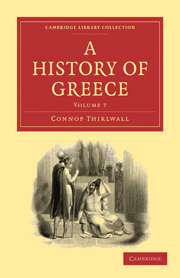Book contents
- Frontmatter
- Contents
- ERRATA
- CHAPTER LIII ALEXANDER'S CAMPAIGNS IN INDIA TO HIS RETREAT FROM THE HYPHASIS
- CHAP. LIV ALEXANDER'S PASSAGE DOWN THE INDUS AND RETURN TO SUSA
- CHAP. LV FROM ALEXANDER'S RETURN TO SUSA TO HIS DEATH
- CHAP. LVI FROM THE DEATH OF ALEXANDER TO THE END OF THE LAMIAN WAR
- CHAP. LVII FROM THE END OF THE LAMIAN WAR TO CASSANDER'S OCCUPATION OF ATHENS
- CHAP. LVIII FROM CASSANDER'S OCCUPATION OF ATHENS TO THE TREATY BETWEEN ANTIGONUS AND PTOLEMY, CASSANDER AND LYSIMACHUS, IN 311 B. C.
- CHAP. LIX FROM THE PEACE OF 311 TO THE BATTLE OF IPSUS
CHAP. LIV - ALEXANDER'S PASSAGE DOWN THE INDUS AND RETURN TO SUSA
Published online by Cambridge University Press: 05 July 2011
- Frontmatter
- Contents
- ERRATA
- CHAPTER LIII ALEXANDER'S CAMPAIGNS IN INDIA TO HIS RETREAT FROM THE HYPHASIS
- CHAP. LIV ALEXANDER'S PASSAGE DOWN THE INDUS AND RETURN TO SUSA
- CHAP. LV FROM ALEXANDER'S RETURN TO SUSA TO HIS DEATH
- CHAP. LVI FROM THE DEATH OF ALEXANDER TO THE END OF THE LAMIAN WAR
- CHAP. LVII FROM THE END OF THE LAMIAN WAR TO CASSANDER'S OCCUPATION OF ATHENS
- CHAP. LVIII FROM CASSANDER'S OCCUPATION OF ATHENS TO THE TREATY BETWEEN ANTIGONUS AND PTOLEMY, CASSANDER AND LYSIMACHUS, IN 311 B. C.
- CHAP. LIX FROM THE PEACE OF 311 TO THE BATTLE OF IPSUS
Summary
However reluctantly Alexander may have abandoned the immediate prospect of further conquests and discoveries in the East, there was still enough to fill his mind, and to gratify his passion for heroic adventures, in the enterprise which he was next to begin. So vague had been, almost down to this time, his notions as to the geography of the regions which he was to traverse on his return to Persia, that when he found crocodiles in the Indus, he conceived a fancy that this river was a branch of the Nile; and this conjecture seemed to him strongly confirmed, when he met with the lotus, such as he had seen in Egypt, on the banks of the Acesines. He even mentioned, in a letter to his mother, that he believed he had discovered the land which contained the springs of the Nile; he thought that, in its course from India to Ethiopia, it might flow through some vast desert, in which it lost its original name. A little inquiry among the natives must have sufficed to correct this error—which seems to prove that he was not well read in Herodotus, and that the expedition of Scylax had excited but little attention in Greece — and that he remained so long ignorant of the truth, shows how singly his views were at first bent towards the East.
The fleet, which was probably for the most part collected from the natives, numbered, according to Ptolemy, nearly 2000 vessels of various kinds, including eighty galleys of war.
- Type
- Chapter
- Information
- A History of Greece , pp. 32 - 69Publisher: Cambridge University PressPrint publication year: 2010First published in: 1840



